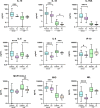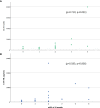CSF Biomarkers in COVID-19 Associated Encephalopathy and Encephalitis Predict Long-Term Outcome
- PMID: 35479062
- PMCID: PMC9035899
- DOI: 10.3389/fimmu.2022.866153
CSF Biomarkers in COVID-19 Associated Encephalopathy and Encephalitis Predict Long-Term Outcome
Abstract
Patients with coronavirus disease 2019 (COVID-19) frequently develop acute encephalopathy and encephalitis, but whether these complications are the result from viral-induced cytokine storm syndrome or anti-neural autoimmunity is still unclear. In this study, we aimed to evaluate the diagnostic and prognostic role of CSF and serum biomarkers of inflammation (a wide array of cytokines, antibodies against neural antigens, and IgG oligoclonal bands), and neuroaxonal damage (14-3-3 protein and neurofilament light [NfL]) in patients with acute COVID-19 and associated neurologic manifestations (neuro-COVID). We prospectively included 60 hospitalized neuro-COVID patients, 25 (42%) of them with encephalopathy and 14 (23%) with encephalitis, and followed them for 18 months. We found that, compared to healthy controls (HC), neuro-COVID patients presented elevated levels of IL-18, IL-6, and IL-8 in both serum and CSF. MCP1 was elevated only in CSF, while IL-10, IL-1RA, IP-10, MIG and NfL were increased only in serum. Patients with COVID-associated encephalitis or encephalopathy had distinct serum and CSF cytokine profiles compared with HC, but no differences were found when both clinical groups were compared to each other. Antibodies against neural antigens were negative in both groups. While the levels of neuroaxonal damage markers, 14-3-3 and NfL, and the proinflammatory cytokines IL-18, IL-1RA and IL-8 significantly associated with acute COVID-19 severity, only the levels of 14-3-3 and NfL in CSF significantly correlated with the degree of neurologic disability in the daily activities at 18 months follow-up. Thus, the inflammatory process promoted by SARS-CoV-2 infection might include blood-brain barrier disruption in patients with neurological involvement. In conclusion, the fact that the levels of pro-inflammatory cytokines do not predict the long-term functional outcome suggests that the prognosis is more related to neuronal damage than to the acute neuroinflammatory process.
Keywords: COVID-19; SARS-CoV-2; encephalitis; encephalopathy; inflammatory cytokines; neuro-COVID; neurofilaments; neuronal antibodies.
Copyright © 2022 Guasp, Muñoz-Sánchez, Martínez-Hernández, Santana, Carbayo, Naranjo, Bolós, Framil, Saiz, Balasa, Ruiz-García, Sánchez-Valle and The Barcelona Neuro-COVID Study Group.
Conflict of interest statement
The authors declare that the research was conducted in the absence of any commercial or financial relationships that could be construed as a potential conflict of interest.
Figures



References
-
- Rogers JP, Chesney E, Oliver D, Pollak TA, McGuire P, Fusar-Poli P, et al. Psychiatric and Neuropsychiatric Presentations Associated With Severe Coronavirus Infections: A Systematic Review and Meta-Analysis With Comparison to the COVID-19 Pandemic. Lancet Psychiatry (2020) 7(7):611–27. doi: 10.1016/S2215-0366(20)30203-0. Elsevier Ltd. - DOI - PMC - PubMed
Publication types
MeSH terms
Substances
LinkOut - more resources
Full Text Sources
Medical
Research Materials
Miscellaneous

